 Visual Communications (VC), the nation’s premier Asian Pacific American media arts center will present 170 outstanding films in the 2010 edition of the Los Angeles Asian Pacific Film Festival (LAAPFF). The largest festival of Asian films in the United States, LAAPFF celebrates Asian Pacific Heritage Month with a diverse slate of films and videos by Asian Pacific American and Asian international directors from 20 countries.
Visual Communications (VC), the nation’s premier Asian Pacific American media arts center will present 170 outstanding films in the 2010 edition of the Los Angeles Asian Pacific Film Festival (LAAPFF). The largest festival of Asian films in the United States, LAAPFF celebrates Asian Pacific Heritage Month with a diverse slate of films and videos by Asian Pacific American and Asian international directors from 20 countries.
The opening night film, Arvin Chen’s rom-com “Au Revoir Tapei” (a Berlin Film Fest hit) plays April 29, 2010 at the DGA (7PM). Produced by Wim Wenders and LAAPFF alum In-Ah Lee (The 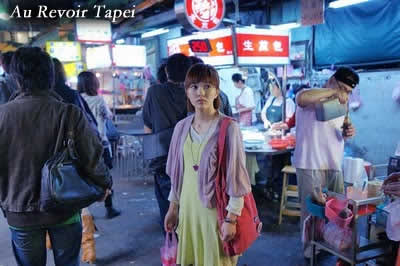 Grace Lee Project). Chen, (another LAAPFF alum/USC grad) will attend the Los Angeles premiere.
Grace Lee Project). Chen, (another LAAPFF alum/USC grad) will attend the Los Angeles premiere.
The sex comedy “The People I’ve Slept With” by another LAAPFF alum Quentin Lee (“Drift“, “Ethan Mao“) plays as the American Centerpiece film on Saturday, May 1, 2010 at the DGA at 7PM. Director Lee, screenwriter Koji Sakai and film’s stars Karin Anna Cheung (Better Luck Tomorrow), Archie Kao (CSI, Desperate Housewives), and Wilson Cruz (He’s Just Not That Into You, My So Called Life,) will attend.
Celebrating Bruce Lee’s 70th birthday, LAAPFF presents a free screening of the classic “The Chinese Connection” April 30 at Madang the Courtyard in Korea Town at Western and Wilshire Blvd. and a special screening of the legendary ENTER THE DRAGON on May 1 at Noon at the Laemmle Sunset 5 (followed by a panel discussion on impact of Bruce Lee on worldwide pop culture. (Reginald Hudlin, Brett Ratner, president of Bruce Lee Enterprises Shannon Lee Keasler, actor/martial artist Bob Wall and others).
Also on May 2 – 4:00 PM at the DGA Atrium – a special panel with the Lee Family and friends including wife Linda Lee Cadwell, daughter Shannon Lee Keasler, God-daughter/actress Diana Lee Inosanto and others will discuss Bruce Lee as the man, the father, the husband, and the friend.
 First time director Arvin Chen’s “Au Revoir Tapei” is a refreshing blend of crime and romantic comedy. Actually, while pretending to be a caper film, it’s actually the story of four lovelorn men. The pursuit of these men’s romantic objectives is the motor of the film, all wrapped around an inept failure of a heist.
First time director Arvin Chen’s “Au Revoir Tapei” is a refreshing blend of crime and romantic comedy. Actually, while pretending to be a caper film, it’s actually the story of four lovelorn men. The pursuit of these men’s romantic objectives is the motor of the film, all wrapped around an inept failure of a heist.
Sentimental Mafioso Brother Bao (Frankie Kao) wants to retire. Gambling, prostitution and the numbers racket hold no more meaning for him since he’s found the love of his life. Actually, the girl he left behind is in Paris and he wants to pursue her. He’s ready to give up his lucrative hold on the underworld, and maintain the legitimate Realty company, which now serves as his front.
Young Kai (Jack Yao) pines for his girlfriend Faye who moved to Paris to study. The lovelorn, penniless Kai is teaching himself French by studying a French grammar book in a bookstore. Skipping out on his duties at his parents’ noodle shop Kai haunts the bookstore where he catches the eye of the comely salesgirl Susie (Amber Kuo). Susie’s interest is peaked by the handsome freeloader and she drifts into a relationship with the shy protagonist.
Kai’s equally shy, big goofball friend Gao has a crush on his convenience store co-worker Peach (Vera Yen) but he’s too tongue-tied to tell her how he feels.
Bao’s greedy nephew Hong (Lawrence Ko) fancies himself the new crimeland boss. His worthless slacker posse (all employees at Brother Bao’s Realty store) let him boss them around. Hong is Bao’s heir, but even Bao realizes how hopeless Hong is. Bao would prefer a smart college boy like Kai to work for him, But Kai’s planning to go to Paris to surprise his girlfriend, who dumped him long 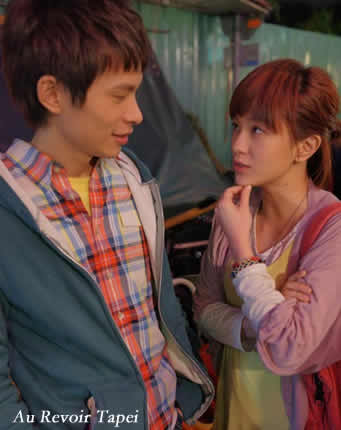 distance.
distance.
Bao offers to bankroll’s Kai’s trip if he will pick up a mysterious package from a mysterious contact. Eavesdropping Hong, believing he’s been cut out of a big score, sends his doofus crew to ambush Kai, while he distracts his uncle to as an alibi. Hong’s arrogance, lack of planning and his bumbling henchmen, all playing at being criminals, botches the job.
Good-looking cop Ji-yong (Frankie Gao) believes his wife (Peggy Tseng) is cheating on him. Preoccupied with jealousy, he fumbles his stakeout of Brother Bao’s establishment. He and his fast-food snacking partner (who repeats everything Ji-yong says because their boss told him to learn from his partner) follow Kai and Hong’s boys unclear what they up to.
Kai, Gao and Susie wind up at the night market with the package, tailed by the two fumbling cops. Hong’s boys lose Kai and the package, but kidnap Gao. Susi and Kai attempt to rescue his friend, who’s being held by the ma jong playing dumbos at “auntie’s” love hotel.
Max Huang’s stylized art direction frames locations like symmetrical color packed prosceniums. The lottery ticket sales store & Brother Bao’s office feel like intricate stage sets. Kai’s cluttered room also has the proscenium feeling of a Cornell Box. (Theatrically formed Fassbinder was fond of this technique, which maximized his locations. The set dressings of rooms often slyly commenting on the characters that lived in them.)
Eli Hsieh’s bright funny costumes and DP Michael Fimognari’s rain slicked night times street scenes add another layer of charm. Tapei’s night market has never looked more interesting or full of life. A delight!
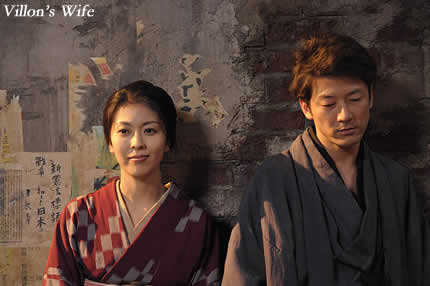 Kichitaro Negishi’s “Villon’s Wife” (Viyon no tsuma), set in devastated post-war Tokyo, follows a long-suffering traditional wife’s attempts to control and survive her suicidal novelist husbands dissolute, self destructive behavior.
Kichitaro Negishi’s “Villon’s Wife” (Viyon no tsuma), set in devastated post-war Tokyo, follows a long-suffering traditional wife’s attempts to control and survive her suicidal novelist husbands dissolute, self destructive behavior.
Mention is made of the suddenly transformed woman’s status in Japan, part of America’s occupying forces involvement in writing Japan’s new constitution. (It may go over the head of American audiences.) But the change has barely hit ground level yet, as Sachi’s adventures show.
Celebrated bad-boy novelist Otani (Tadanobu Asano) spends all his money on gambling and drinking, leaving meek wife Sachi, and their retarded young son to virtually starve. When Otani steals money from a bar he frequents, the outraged elderly couple follows him home and confronts his wife. Otani pulls a knife and flees, but Sachi (Takako Matsu) offers to pay the couple back by working at their bar.
Attractive well-meaning Sachi brings their two-year-old son to work. Soon the failing bar is filled with drinkers, all lured by Sachi’s comely charms. Happy for their good fortune, bar owners Kichizo (Masatô Ibu) and wife Miyo (Shigeru Muroi) bond with Sachi, treating her like a daughter
Sachi’s would-be suitors fall over them selves competing to give her the biggest tips. As sweet Sachi learns to deflect the boldest advances, she begins to enjoy her suddenly active life. Economically independent and able to feed her son, she discovers life outside the lonely confines of a traditional home. The film takes on the air of a daffy comedy.
But gigolo Otani’s abandoned lovers frequent the now popular bar. Besides seducing the barman’s wife, he’s driven well-born Akiko (the marvelous Ryoko Hirosue) to tenement life. The desperate love addict Akiko sold her kimono’s to pay his bar bill now she stalks him 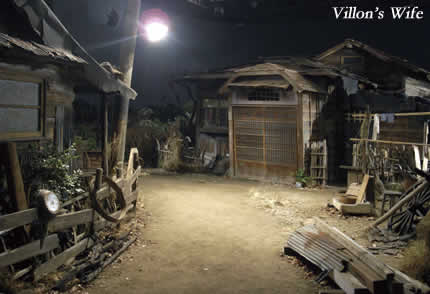 to the bar.
to the bar.
A chance encounter with Tsuji (Shin’ichi Tsutsumi) the now successful lawyer she jilted to marry charismatic Otani gives Sachi an unlikely ally. The ironic back-story of the love triangle I’ll leave you to discover.
Understanding Sachi supports her husband covertly, hiding her identity from Akiko and the older woman who settles his extensive debt. Absurdly jealous Otani and his faithful Akiko attempt a love suicide. He survives and is charged with attempted murder.
The streets are filled with GIs and the western-dressed loose women that chase them. Shot in the elegant muted hues of a classic Japanese film of the early 50’s, the quietly bleak melodrama played by a strong ensemble cast, won the Best Director award at the Montreal World Film Festival.
The film was based on Osamu Dazai’s 1947 autobiographical novel. Dazai killed himself two years after the story of published.
LAAPFF’s doc section is particularly strong. Cambodian reporter Thet Sambath and British documentarian Rob Lemkin collaborated on the exceptional “Enemies Of The People.” Sambath, whose family were killed in the “killing fields” of the Khmer Rouge, spent a decade patiently wooing a friendship with Khmer Rouge second in command, Nuon Chea AKA “Brother Number Two.” Years into his freelance assignment, Thet Sambath met Brit filmmaker Rob Lemkin, who was on a research trip to Cambodia during the 2006 Khmer Rouge Trials. Dedicated Sambeth repeatedly visited Nuon Chea and other interviewees gaining their trust. These weekend trips to the countryside nearly destroyed his family life.
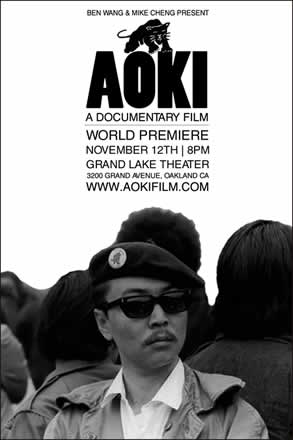 Smiling patiently as he listens to harrowing truths, Sambath never reveals that his family were Kymer rouge victims, lest he lose the participant’s stories. “I think only the killers can tell us the truth. Why they killed the people and who ordered them to kill,” explains his narration, which reveals a Buddhist compassion as well as a tenacious digging for the truth.
Smiling patiently as he listens to harrowing truths, Sambath never reveals that his family were Kymer rouge victims, lest he lose the participant’s stories. “I think only the killers can tell us the truth. Why they killed the people and who ordered them to kill,” explains his narration, which reveals a Buddhist compassion as well as a tenacious digging for the truth.
Peasant soldiers were forced to kill or be executed themselves. An uneasy interviewee smiles at the camera as he demonstrates the throat cutting style he was taught and used on hundreds of bound victims.
No amount of archival footage can match the power of this astounding documentary. What began as a investigation, seeking the justice that revealing the truth can bring, becomes over time, a lesson in forgiveness as Sambeth finds himself oddly concerned for the ailing Nuon Chea, once he’s arrested to face War Crime trials.
Ten years of visits wears down Chea’s defenses. The now frail 83-year-old tyrant, known as the ideological leader of the genocidal regime, at first denies knowledge of the local level assassinations. Eventually he acknowledges that the rural mass murders were policy handed down from the top. Sambath reveals that his family members were all killed and Nuon Chea, apologizes. This is the unique time that a high level Khmer Rouge accepted responsibility for the extensive war crimes. (Pol Pot died in 1998.)
Interviews with victim’s relatives, peasants who point out where the bodies lay in the now tranquil countryside, and low-level participants in the army massacres add some additional color, but it is the final resolution with Chea that gives the film it’s dramatic force. (Originally run as SBFF coverage)
Like the masterful documentaries of China’s New Documentary Movement (NDM) and Eyesteelfilm’s earlier release “Up The Yangtze“, “Last Train Home” reveals the collateral damage of China’s Globalization. Following one family through several years, Canadian-Chinese filmmaker Lixin Fan reveals migratory life of Chinese rural workers.
Sixteen years ago, Changhua Zhang and wife Suquin left their village to find work in the Guangzhou province garment factory. Their newborn (eldest Qin) and subsequent son (Yang, now10) was left behind to be raised by their grandparents. The couple has been working towards the day when all the family can be united to live a normal family life in their ancestral village. Once a year, during Lunar New Year they battle their way home to see their children.
130 million workers attempt to visit their families during the traditional Lunar New Year. This seasonal migration from urban centers to rural China is the largest migration on earth and strains the train system beyond its  breaking point. Watching daunting shots of huge crowds waiting in the rain outside the train station, your brain grapples with the enormity of the migration. Chaos overwhelms the under-equipped train stations, as desperate people swarm any official and try to squeeze any opening. In the crowd, Fan’s camera picks out the Zhangs, who’ve waited a week in the hopes of buying tickets. They will travel over 2,000 kilometers by train, bus and ferry to spend a few days with their children.
breaking point. Watching daunting shots of huge crowds waiting in the rain outside the train station, your brain grapples with the enormity of the migration. Chaos overwhelms the under-equipped train stations, as desperate people swarm any official and try to squeeze any opening. In the crowd, Fan’s camera picks out the Zhangs, who’ve waited a week in the hopes of buying tickets. They will travel over 2,000 kilometers by train, bus and ferry to spend a few days with their children.
At home, the couple try to reassert their parental roles, nagging their kids about the homework, but it’s clearly too little, too late. They’ve become ‘latch key’ parents.
Bored with the rural life her parents have sacrificed to maintain for their kids, Adolescent Qin resents their abandonment. She can’t imagine the drudgery and substandard life style they’ve accepted as their part of the bargain. Soon after their annual trip, Qin drops out and moves to Guangzhou, where teen co-workers become an ersatz family, supplying the family energy her aged grandparents couldn’t provide.
To the stoic couple, who’ve sacrificed their family life to provide their children with an education and a way out of sweatshop labor, Qin’s act is a nightmare betrayal.
A year later we watch the family, Qin included, traveling home for the New Year. An epic snowstorm knocks out the electrical grid. Travel grinds to a halt. Trains are delayed for days. The crowds, fighting their way through the station barriers are even more daunting than the year before. It’s a hellish scene. By the time they magically make it onto their train, the family is feuding. Suquin and Changhua have been lobbying Qin to return to school. She sits in sullen silence.
Back home, Qin, who seethes with resentment when her estranged family attempt to act parental, loses it. Goading her father with the F-word, we watch an uncomfortable, abusive slap fest. Her 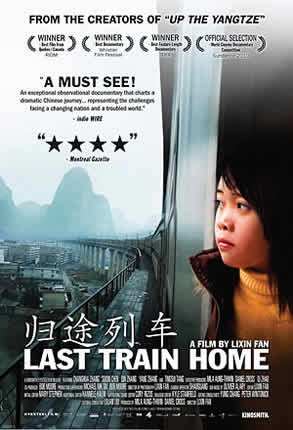 father, whose patriarchal culture demands filial obedience is livid. He throws his own tantrum. Turning to the omnipresent camera Qin shrieks “You want to film the real me, this is the real me”.
father, whose patriarchal culture demands filial obedience is livid. He throws his own tantrum. Turning to the omnipresent camera Qin shrieks “You want to film the real me, this is the real me”.
The kind of massive economic transformation has no equivalent in our culture. The traditional family unit, stable throughout the twentieth century and Mao’s revolution, have splintered under industrialization and globalization. The problem of latchkey kids is magnified to an epic proportion.
Conversations on the two-day train journey flesh out contemporary Chinese culture as various people opine on the economy and the West. A soundtrack of lyrical piano and pop music underscores China’s straddling of traditional and Global culture.
With all access to the family, Fan’s verité hand-held lensing creates a family drama stewed in the stress of China’s economic miracle.
(Originally run as SBFF coverage)
Recommended “Ms. Tu Hau” (Chi Tu Hau), the Vietnamese drama which won the Silver Medal at the Moscow International Film Festival in 1963.
“Manila Skies” (Himpapawid) the story of a “deranged hijacker pushed to the edge of insanity as he struggles with the oppression of surviving in modern Philippine society.” Inspired by the true story of the May 2000 PAL Flight 812 hijacking en route from Davao to Manila.
The lyrical award-winning “Bakal Boys” (Children Metal Divers) about kid junk scavengers in Baseco. Director Ralston Jover wrote the scripts for Brillante Mendoza’s “Foster Child” and “Tirador” (Slingshot).
Xiaolu Guo’s “She, a Chinese”. A Chinese pop soundtrack underscores the adventure of a country teenager determined to get to the big city.
(Golden Leopard winner 2010 Locarno).
Le Thanh Son’s hotly anticipated actioner “Clash” (Bay Rong).
Two recommended music-themed features: Eyad Zahra’s “The Taqwacores”: Based on the novel by Michael Muhammad Knight about the hardcore Muslim punk-rock scene.
Chil Kong’s musical comedy “Mikado Project” about a struggling Asian American theatre company’s restaging of Gilbert and Sullivan’s “The Mikado” to stir controversy and spur ticket sales. A World Premiere.
Granaz Moussavi’s guerilla shot “My Tehran For Sale“. Shot in the music and theatre scene of Tehran, Moussavi captures the repression faced by middle class, literate Iranians, intensified by the recent election, protest, and state reprisal.
Recommended documentaries: S. Leo Chiang’s “A Village Called Versailles” tracks the challenges of a Vietnamese community in eastern New Orleans after Hurricane Katrina; “Aoki” Ben Wang & Mike Cheng’s portrait of Richard Aoki (1938-2009), a third-generation Japanese American and a founding member of the Black Panther Party: Miao Wang’s “Beijing Taxi.”
LAAPFF’s feast of International shorts includes films by Arab, Chinese, Filipino, Japanese, Korean, Indian, Iranian, Latino, Vietnamese and US filmmakers. Some Recommended Shorts: “Bicycle” (Jitensha), “One Day After 10TH Day” (Yek Rooz Pas Az Dahomin Rooz), “Ajumma?! Are You Krazy?”, “The Hirosaki Players.”
April 29 – May 8, 2010 at the Director’s Guild of America (DGA), Laemmle Sunset 5 Theatres, Downtown Independent Theatre, The Tateuchi Democracy Forum the National Center for the Preservation of Democracy, and the Aratani/Japan America Theatre.
For tickets and info go to www.vconline.org/festival or contact Visual Communications at (213) 680-4462 x68. Tickets are on sale now online.
